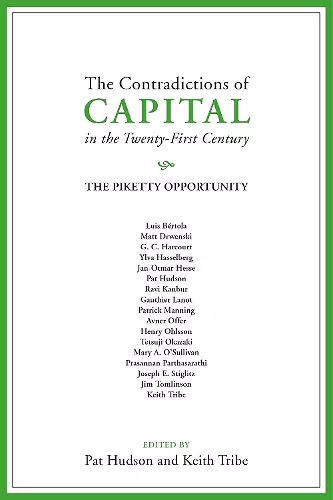The Contradictions of Capital in the Twenty-First Century
The Piketty Opportunity
Professor Pat Hudson editor Dr Keith Tribe editor
Format:Hardback
Publisher:Agenda Publishing
Published:30th Oct '16
Currently unavailable, and unfortunately no date known when it will be back

This volume of essays builds upon renewed interest in the long-run global development of wealth and inequality stimulated by the publication of Thomas Piketty’s Capital in the Twenty-First Century. It brings together an international team of leading economic historians and economists to provide an overview of global developments in the theory and reality of inequality and its salience in the modern world order.
The contributors take stock of the key concepts involved in contemporary debates capital, wealth and income distribution, economic development, private and collective assets, financialization, global liberalisation and evaluate the evidence for both common and contrasting historical trends in national statistical data sources. To the developed economies upon which Piketty drew are added contributions covering Latin America, Africa, India and Japan, providing a global perspective upon a global phenomenon.
The book seeks to provide readers with a deeper awareness and understanding of the significance of inequality in economic development, the varying pace and nature of economic change around the world, and the manner in which this process of change affects the distribution of incomes and wealth in diverse economies. The collection marks an important step in the process of developing Piketty’s analytical framework and empirical material, overcoming some of their limitations and helping to cement a lasting place for inequality in the future agenda of economics and economic history.
This excellent volume effectively exploits and builds on ‘the Piketty opportunity’: the contested new terrain created by Thomas Piketty’s challenge to mainstream economics and economic history. With their deep knowledge of the history of the study of inequality in various regions of the world and in the discipline of economics, the contributors engage critically with Piketty’s Capital in the Twenty-First Century to provide a plethora of new insights and important alternative policy proposals. This volume demonstrates why public policy-makers need to pay full attention to historians in grappling with the political trilemma of our age posed by Piketty: democracy, capitalism and inequality. -- Simon Szreter, University of Cambridge
This splendid book validates Thomas Piketty's Capital precisely through its lucid, comprehensive and in places devastating critique of his capital theory and empirical methods, with rich detail on France, Germany, Sweden, the UK and the US, as well as Japan, Africa and India. As companion reading or on its own, Contradictions is a landmark, a model of scholarly engagement at the highest level. -- James K. Galbraith, Lloyd M. Bentsen, Jr. Chair in Government/Business Relations, University of Texas at Austin
Drawing in a critical and reasoned manner on the work of Thomas Piketty, this clear and rigorous book assembles leading specialists in the field to propose a global analysis of inequality. In remarkably illuminating fashion, it evokes the tragedy of inequalities in the dynamic of capitalist systems in the long term and places into stark relief the urgency for well informed action.
-- Philippe Minard, Ecole des Hautes Etudes en Sciences SocialesHudson and Tribe have, with their selection of authors, and their outstanding contributions, substantively re-launched the enquiry into inequalities. The essays have provided further opportunities to explore the potential links between economic history and economics, theoretical and empirical; to ask questions in a different way, rethink concepts and the nature of information; to go beyond what each discipline on its own can give, to tell another story. Their book could be a landmark collection. -- Prue Kerr, Contributions to Political Economy
A welcome contribution . . . The chapters produced by Patrick Manning, Matt Drwenski, Tetsuji Okazaki and Prasannan Parthasarathi are particularly valuable as they consider regions often ignored and about which little is known. Each on their own present relevant empirical contributions linking certain key regions to what we can refer to as the ‘Piketty narrative.’ For these chapters alone, the book should be considered a valuable addition to one’s library.
-- Vincent Geloso, EH.NetIt offers rich and variegated comment on Capital in the Twenty-First Century that is sometimes critical, sometimes complementary, and is surely valuable for anyone who wants to delve deeper into the many historical processes, settings, and incidences that Piketty has interwoven in his long history of rising inequality. -- Peter Lindner, Economic Geography
The main sections of the book aim to particularise the analysis of inequality by looking at the trends, institutions and politics of different countries – one section on western economies, one on major economies elsewhere. As Luis Bértola points out here, Piketty is very Eurocentric. Having these different national perspectives is a useful contribution to what is turning out to be quite an extensive new literature on inequality. -- Diane Coyle, The Enlightened Economist
ISBN: 9781911116103
Dimensions: unknown
Weight: unknown
312 pages